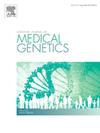Parental communication about inherited conditions with young Children: Insights from genetic professionals in Portugal
IF 1.7
4区 医学
Q3 GENETICS & HEREDITY
引用次数: 0
Abstract
Genetic healthcare professionals (GHP) are key in supporting parents in communicating about inherited genetic conditions (IGC) with their young children. This study explored the attitudes, clinical practice and perceptions of Portuguese GHP’ regarding parental communication about IGC with young children. We conducted an observational and cross-sectional study with 32 GHP, 75 % of whom were women, and 37.5 % were aged 31–40 years old. The survey included sociodemographic and professional questions, along with 35 statements to be answered on a 4-point Likert scale (ranging from 1- strongly disagree to 4- strongly agree). Key findings show that GHP: (i) perceive that parents fear the impact of genetic information on their children's emotional wellbeing (3.53 ± 0.51), are receptive to support from GHP (3.16 ± 0.57), and should tailor communication to children's developmental stage (3.56 ± 0.50); (ii) report being available to support parents when asked (3.56 ± 0.62) and encourage parents to communicate openly (3.47 ± 0.57); and (iii) assess parents' level of understanding about the IGC (3.41 ± 0.56), raise parents' awareness of the importance of informing their children (3.28 ± 0.52), and support parents in adapting communication to the type of IGC (3.28 ± 0.58), and the child's developmental stage (3.22 ± 0.55). Results emphasize critical role of GHP in facilitating parent-child communication about IGC, highlighting their commitment to supporting these sensitive conversations.
关于与幼儿遗传条件的父母沟通:来自葡萄牙遗传专业人士的见解。
遗传保健专业人员(GHP)是支持父母与年幼子女沟通遗传遗传病(IGC)的关键。本研究探讨了葡萄牙GHP对父母与幼儿进行IGC沟通的态度、临床实践和看法。我们对32名GHP进行了一项观察性横断面研究,其中75%为女性,37.5%年龄在31-40岁之间。该调查包括社会人口统计和专业问题,以及35个陈述,以4分的李克特量表(从1-非常不同意到4-非常同意)作答。主要研究结果表明:(1)家长认为遗传信息对子女情绪健康的影响(3.53±0.51),接受父母的支持(3.16±0.57),并应根据儿童的发展阶段进行沟通(3.56±0.50);(ii)报告可在被要求时为父母提供支持(3.56±0.62),并鼓励父母公开沟通(3.47±0.57);(3)评估家长对IGC的了解程度(3.41±0.56),提高家长告知孩子重要性的意识(3.28±0.52),支持家长沟通适应IGC类型(3.28±0.58)和儿童发育阶段(3.22±0.55)。结果强调了GHP在促进父母与儿童就IGC进行沟通方面的关键作用,强调了他们对支持这些敏感对话的承诺。
本文章由计算机程序翻译,如有差异,请以英文原文为准。
求助全文
约1分钟内获得全文
求助全文
来源期刊
CiteScore
4.10
自引率
0.00%
发文量
193
审稿时长
66 days
期刊介绍:
The European Journal of Medical Genetics (EJMG) is a peer-reviewed journal that publishes articles in English on various aspects of human and medical genetics and of the genetics of experimental models.
Original clinical and experimental research articles, short clinical reports, review articles and letters to the editor are welcome on topics such as :
• Dysmorphology and syndrome delineation
• Molecular genetics and molecular cytogenetics of inherited disorders
• Clinical applications of genomics and nextgen sequencing technologies
• Syndromal cancer genetics
• Behavioral genetics
• Community genetics
• Fetal pathology and prenatal diagnosis
• Genetic counseling.

 求助内容:
求助内容: 应助结果提醒方式:
应助结果提醒方式:


